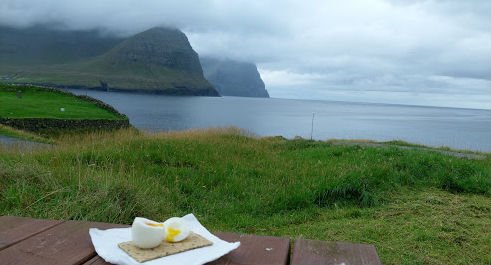
You Could Do Worse Than a Boiled Egg and a Sweet View

You Could Do Worse Than a Boiled Egg and a Sweet View
Eggs in the Faroe Islands
It’s been raining for five days straight and I’ve yet to glimpse the sky. The low, impenetrable clouds only add to my feelings of isolation. I’m in the Faroe Islands, alone, to film a short documentary on whaling. I have yet to get any shots of the fairytale-like scenery—waterfalls cascading off clifftops and crashing into the sea, grass-roofed wooden churches and craggy, ominous mountains—without getting drenched. My spirits are pretty low.
I spend my days driving from island to island (there are 13 here, although some are only accessible by boat or helicopter), hoping for a weather change. The climate is a national topic of conversation; the Faroese can see snow, rain, sun, and sleet all in the same day.
Today I’m up early. I’ve heard rumors of a break in the weather on Kunoy. I grab a boiled egg and a couple of crackers from the uninspiring buffet table at my hostel to eat in the car. It’s become a boring morning breakfast ritual.
Food can be difficult out here. Faroe Islanders hunt and eat whales. It’s called grindadráp, an age-old tradition whereby pilot whales are herded into designated bays and killed by villagers, turning the sea a startling red. They can only grow five types of food on the island, so what they can’t grow, hunt, or fish, they have to import. This means fresh fruit and vegetables are eye-wateringly expensive, and food can be unremarkable, let’s say, if one isn’t dining in one of the capital’s few (and expensive) restaurants.
Although Kunoy is almost the other side of the country from where I’m staying in Torshavn, it’s only a 90-minute drive. I meander through dark, dank tunnels in the mountains, on winding roads carved out of deep, lush green valleys. The rain is unrelenting, the wind so fierce I have to stop the car at one point for fear of being blown off the road.
As I maneuver another hairpin bend, I finally glimpse the sun piercing through the clouds. The fjord pans out below me, and among the rolling fields and foreboding water, there’s a small, white church.
I glance at the forgotten bundle of napkins on the passenger seat containing the egg and crackers. I’m suddenly hungry and the thought of my simple breakfast makes my stomach rumble. I drive down to the church, hoping for a place to sit. I find a small picnic bench perched on the side of a hill, between the church and the sea. My only company is the few gravestones in the church’s cemetery.
I unwrap my breakfast, crack the egg on the picnic table, peel off the shell and break it in two with my hands. I didn’t bring a knife. I take a bite. The crunch of the cracker seems deafening in the stillness.
A boiled egg on a cracker: my breakfast isn’t organic, local, or “farm fresh.” But paired with complete silence, solitude, and the scenery, suddenly the food doesn’t matter so much.